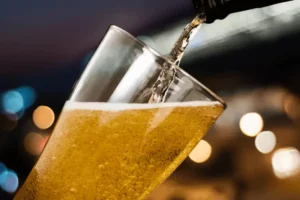
Staying hydrated is also crucial during alcohol detox, as it can help prevent or alleviate symptoms of dehydration, headaches, and fatigue commonly experienced during withdrawal [1]. Similarly, nutritional yeast contains many B vitamins that your body is likely missing as a result of alcohol use. Incorporating nutritional yeast into your diet is easy, as it makes a great savory topping or a thickener in soups, smoothies, and sauces.
- But at the grocery store, they instinctively opt for “low fat yogurts” (often filled with sugar) and cut off the most marbled parts of their ribeyes.
- With prolonged alcohol use, your body can come to rely on alcohol to feel good, and crave the boost in feel good chemicals.
- You may have a strong urge to eat sweets because they set off dopamine, the same chemical messenger triggered by some drugs.
- As you’ve likely heard, heavy alcohol consumption can be damaging to your brain.
Foods to Avoid on an Alcohol Detox Diet
A high intake of fruits and vegetables and avoiding processed or sugary foods is also important to getting the nutrients that your body needs. Adopting a balanced diet can assist the body in healing and recovering from the damage inflicted by long-term alcohol abuse. To effectively replenish nutrient reserves, focus on including a variety of foods in your diet. Fresh fruits, vegetables, lean proteins, and whole grains can provide a wide range of essential nutrients. Additionally, healthy fats, such as those found in avocados, nuts, and seeds, can also contribute to nutrient reserves and provide sustained energy. The connection between nutrition and alcohol detox cannot be stressed enough.
Foods That Cause Fatigue
- Another strategy to consider is the use of kombucha tea to stand in and provide relaxation during times you’d normally desire alcohol.
- Soups that contain vegetables and lean protein can help provide the nourishment that your body needs.
- Adequate hydration can prevent or alleviate symptoms of dehydration, headaches, and fatigue commonly experienced during withdrawal.
Protein boosts your energy levels and enhances your body’s ability to absorb certain vitamins and minerals. Protein is important for those whose bodies can no longer absorb nutrients on behalf of alcohol use disorder. Protein also helps boost memory, concentration, and mental clarity that may also be inhibited by alcohol use.
Vitamins & Supplements for Alcohol Recovery
By focusing on nutrient-dense foods and avoiding processed and sugary foods, you can support the body’s recovery process and manage withdrawal symptoms more effectively. Remember, every step taken towards a healthier diet contributes significantly to the success of an alcohol detox meal plan. Modifying your diet to include healthier, nutritious foods is essential to achieving improved overall health and lasting sobriety when recovering from alcohol use disorder. Evidence even shows that a healthy diet can help correct an imbalance in hunger hormones and eliminate alcohol cravings — a withdrawal symptom that commonly leads to relapse. A well-balanced diet is important to build up your vitamin and nutrient stores and keep you healthy during the recovery process. A healthy, balanced diet includes plenty of fruits and vegetables, lean sources of protein like fish and poultry, whole grains, nuts, beans and low-fat dairy.

That’s why including foods rich in zinc in your alcohol cleanse diet will ensure that you’ll repair and strengthen your immune system. At The Recovery Village Columbus, we care about helping you feel your best during recovery, ultimately succeeding in your recovery journey. Contact a Recovery Advocate today to learn how we can help you achieve lasting freedom from alcohol addiction. Many people can recover if they go to a specialized rehab center that uses proven treatments. Alcohol treatment uses various methods to help with withdrawal and addiction.
Foods Rich in Iron
Look for a multivitamin (or several) that contains omega 3 fatty acids, magnesium, zinc, and of course vitamins A, B, C, D, and E. These are the building blocks of proteins, which are essential for the structure and function of the brain cells. Amino acids are also involved in the making of neurotransmitters, which are the chemical messengers that send signals between the neurons. Some of the most important amino acids for neuroplasticity are tryptophan, tyrosine, phenylalanine, and glutamine.

Diet & Nutrition in Recovery
A positive mood is also affected by proper nutrition because it can positively affect an individual’s outlook on life–lessening the risk of relapse in some cases. When detoxing from alcohol, you’ll likely be told that drinking water is a vital part of the process. During alcohol withdrawal, the body is adjusting to less fluid intake than usual, which is why hydration is so important during detox. Withdrawal symptoms like vomiting, diarrhea and sweating can also contribute to dehydration, but drinking water can help replenish lost fluids.

- This balance ensures that individuals in recovery receive the necessary nutrients to help rebuild their bodies, support brain health, and facilitate a successful recovery journey.
- This is something to be aware of when you pick out alcohol alternatives to drink.
- For both to work together, a healthy, well-planned diet will give a former substance user the tools – both mental and physical – needed to repair his or her body and willpower.
Focus on a high-fiber diet during detox, including leafy vegetables, whole grains, beans and peas. If you find yourself craving sugar during the withdrawal phase, it’s best to seek out healthy, natural alternatives like fruit. Fruit provides your body with other nutrients that are usually absent in foods that are heavy in refined sugars. The process of alcohol detoxification requires more than just eliminating alcohol from the diet. It also involves making conscious decisions about what foods to consume and avoid. Paying attention to diet can significantly support the body’s recovery during an alcohol detox.
These are molecules that stop the bad effects of free radicals, which are unstable and reactive atoms that can hurt the brain cells and reduce neuroplasticity. Antioxidants can also change the expression of genes and proteins that are involved in synaptic plasticity (the ability of connections between neurons to change their strength and efficiency) . Some of the most best diet for recovering alcoholic powerful antioxidants for the brain are vitamin C, vitamin E, flavonoids, and carotenoids. These can be found in fruits, vegetables, nuts, seeds, spices, and herbs. Vegetables like spinach, kale, romaine lettuce and other salad greens can provide vitamin B6, folic acid and beta-carotene. These are all nutrients that are often found to be deficient in alcoholics.

